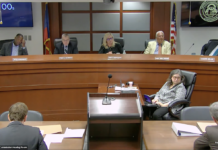
ATLANTA (GA Recorder) — The Georgia Board of Education voted 11-2 Thursday to approve a resolution that says the United States is not racist and that public school students should only be taught that slavery and racism are betrayals of the country’s founding principles.
The resolution is a response to concerns that “critical race theory” could be taught in Georgia classrooms. It says that teachers should not teach any concept that declares one race inferior to another, that one race is inherently racist or oppressive, anything that would make a student feel guilty over their race or sex, or that “meritocracy or traits such as a hard work ethic are racist or sexist, or were created by members of a particular race to oppress members of another race.”
The resolution also says teachers should not teach that slavery and racism “are anything other than deviations from, betrayals of, or failures to live up to, the authentic founding principles of the United States, which include liberty and equality.”
Critical race theory is an academic framework defining racism as upheld through legal and social structures rather than simply individual bias. Critical race theorists argue that racial disparities in matters like wealth or education arise from policies that favor white people over Black people.
State lawmakers across the country are rushing to pass legislation banning the teaching of what was until recently a niche academic study.
The resolution does not mention critical race theory by name. Scott Sweeney, chair of the governor-appointed board, said the resolution does not target any specific school of thought and is intended to ensure no divisive ideology is presented in Georgia classrooms.
“Can you imagine any supremacist ideology making its way into standards? I cannot,” he said. “So this is agnostic with regard to those types of divisiveness. Any divisiveness is really not something that should be integrated within a standard.”
The resolution came in response to Gov. Brian Kemp’s May 20 letter in which he called on the board to “take immediate steps to ensure that Critical Race Theory and its dangerous ideology do not take root in our state standards or curriculum.”
Board member Mike Royal said he has heard about educators teaching ideology in Georgia schools.
“Whether it’s critical race theory, whether it’s as Scott mentioned, whether it’s neo Marx — whatever thing anybody’s trying to infiltrate and indoctrinate — and that’s not what teachers do. But I can tell you as a parent, some of it is starting to filter into high school,” he said.
The passage of the resolution does not change Georgia’s curriculum but opens the way for further discussion and a potential rule change, Sweeney said.
“This is a belief statement more so than anything else or an affirmation,” he said. “I want to make it very clear that this resolution today doesn’t put the brakes on anything that is already occurring in the classroom.”
Critical race theory is generally not taught until college, said Atlanta Public Schools Board Chair Jason Esteves.
“Critical race theory is an upper-level, higher education class,” he said. “It is being cast as some kind of curriculum that’s being taught in classrooms, but what is happening in Atlanta and elsewhere is that teachers and students are having conversations about racism, systemic racism, equity, bias, anti-bias, privilege, a whole bunch of different issues. And they’re debating.”
Esteves said he’s worried the bill could stifle that debate and leave students less prepared to talk about race once they head to college or enter the workforce.
The term critical race theory itself was seldom mentioned in public schools since it was created by academics in the 1970s, but it has become the latest front in the American culture war.
“I think that the term critical race theory has been more of a lightning rod for people,” Esteves said. “Instead of focusing on diversity and inclusion, now they’re focused on critical race theory as an umbrella term for all of this stuff.”
The discussion comes after Black Lives Matter protests over police violence against Black people swept across the country last year, including demonstrations at the Georgia Capitol.
“What’s most concerning is at a time when so many were committed to racial equity and ending systemic racism coming out of the Ahmaud Arbery, George Floyd incidents last year, it seemed like more people than ever before were recognizing that systemic racism exists, and this is like a step backwards,” Esteves said.
The backlash from conservative Georgians against critical race theory has been swift and not always limited to the theory itself. In Cherokee County, Maryland, principal Cecelia Lewis withdrew her acceptance of a job as an administrator whose duties included overseeing diversity, equity, and inclusion for the suburban Atlanta school district after a raucous school board meeting in which parents pushed the board to adopt a resolution pledging not to incorporate critical race theory – even though it never planned to do so.
In an interview with the Cherokee Tribune, Lewis said she decided not to take the job after receiving threatening emails calling her a Marxist bent on taking jobs away from the community.
“Allowing the opponents of DEI and accusers of critical race theory indoctrination to turn these words into negatives is absurd,” said Lewis, who told the Tribune she had not heard of critical race theory before she was accused of bringing it to Cherokee County. “It’s as absurd as someone seeing me use the items divider in a supermarket’s checkout line to separate my items from yours as a courtesy and someone saying that because I did that, I must believe in segregation.”
Tracey Nance Pendley, Georgia’s 2020 teacher of the year who serves on the board in an ex-officio capacity, said she has heard from many teachers opposed to the resolution because they feel they will be censored in the classroom.
“We cannot, absolutely cannot, ignore the extensive research in the field of the systemic barriers that exist in our country, you know, within housing, within law enforcement, and that’s also in education,” Pendley said.
“Every good teacher knows that real learning comes when students are constructing their own knowledge,” she added. “That means giving our students all of the resources, allowing them to tackle difficult conversations in the classroom.”

Remonia Toombs, a fifth-grade teacher at Atlanta Public Schools, said she fears the resolution could leave big blank spaces in history lessons.
“If I’m teaching you math, and we’re doing long division — nobody likes long division – they get physically sick during that time. But if I don’t teach all the steps of long division, if I leave out a step, do we get the correct answer? No,” she said. “My job is to give them all the facts, whether they are good, bad, or indifferent.”
Board member Kenneth Mason, who is Black, said the resolution downplays the racism that minority students experience.
“When I read it, it made me feel like I didn’t belong because it excused the existence of racism in my life, in my two children’s lives, that you’ve met, and the millions of families that it affects,” he said.
Other board members disagreed.
“It was a way that said America and our principles of what we stand for — life, liberty and the pursuit of happiness, and all those things — they’re independent to each other, and not separating race against race or people against people, so I’m sorry, I saw it in a different way,” said board member Helen Odom Rice.
Board member Scott Johnson said the resolution is just as relevant now as it would have been before the 1965 Voting Rights Act.
“If this were 1964, would I support this just as equally as I believe this resolution is a good resolution today?” he said. “I’ve come to the answer that I would because things have changed in our country since 1964. In that 50 years, we’ve gone a long way, and we certainly are not a perfect country today. But if we were in the midst of a civil rights struggle, I believe this resolution would be just as appropriate.”
Emory University political science professor Andra Gillespie said critical race theory can be a useful tool to help explain some of the reasons why America is not a perfect country today. She gave the example of the postwar boom and the G.I. Bill, which allowed white veterans returning from World War II to attend college, purchase homes, and invest more in their children’s education, ushering in an economic expansion that lasted for decades.
“Historians and political scientists and sociologists understand that, and that’s what we’re talking about,” she said. “There’s a way to tell a 16-year-old that. I’m probably not going to tell a nine-year-old about it because I don’t think they’ll be able to understand, but the same way you do it for things that are good, let’s talk about the dark underbelly, about how Black vets did not receive the same benefits even though they fought alongside their white counterparts.”
The fact that Black veterans were left out of those benefits and the generational wealth they helped create helps explain the wealth gap that exists today, but that should not be taken as an attack on white people, Gillespie said.
“Nobody’s telling you to hate your grandpa for taking advantage of the GI Bill,” she said. “Nobody was upset about that; what Black vets were upset about was their inability to take advantage of the same benefits as white vets.”






